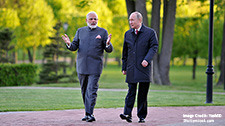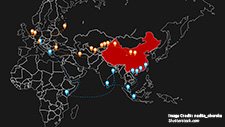Asserting Statehood: Kazakhstan’s Role in International Organizations
Svante E. Cornell and Johan Engvall
Since the fall of the Soviet Union, Kazakhstan has developed a record of being the most proactive and innovative former Soviet republic in the sphere of international cooperation. Kazakhstan’s multilateral relations have always expressed a clear logic: to establish itself as a reliable and constructive international actor. The core of this strategy has been to create several foreign policy pillars – Russia, China, the U.S., the EU, Turkey – without prioritizing one too heavily over the other.
However, in recent years the Russian pillar has expanded heavily, thus compromising the delicate balance of Kazakhstan’s multi-vector foreign policy. To counter this tendency, Astana has been seeking alternative external partners and avenues more persistently than ever – over the past two years, Kazakhstan has joined the World Trade Organization, obtained a seat at the Asia-Europe Meeting, signed an Enhanced Partnership and Cooperation Agreement with the European Union, announced it would host the EXPO-2017 in Astana, and launched a bid for a rotating seat at the United Nations Security Council.
This paper argues that Kazakhstan’s success in maintaining a balanced foreign policy – and in the process keeping the heart of Eurasia open – will depend on the existence of partners willing to engage with the region. It is in the West’s interests to support Kazakhstan’s efforts to maintain balance, in particular in the light of an increasingly polarized and unfavorable geopolitical context in Central Asia.
Related Publications
-
ISDP Annual Report 2023
ISDP’s Annual Report for the year 2023. We look back on 2023, a year in which tensions and conflicts captured the strategic space in ISDP’s focus areas, making headlines around […]
-
Promise And Peril In The Caucasus
America’s national security bureaucracy separates the Caucasus and the Middle East into different bureaus, with Central Asia in yet another office. This is part of the reason the U.S. has […]
-
The Limitations of India and Russia’s Transactional Relationship
Since Russia’s unprovoked invasion of Ukraine in February 2022, it might seem as though ties between India and Russia have strengthened. While much of the West isolated Russia, India-Russia energy […]
-
IN DEFENSE OF THE LIBERAL INTERNATIONAL ORDER
In recent years, the geopolitical fight for global economic, diplomatic, and institutional control has acutely intensified, accentuating the crisis in the existing post-World War II Liberal International Order (LIO), championed […]
-
China in Eurasia: Revisiting BRI amidst the Russia-Ukraine Crisis
This paper discusses China’s trade and connectivity plans under the Belt and Road Initiative (BRI) in the Eurasian region and the impact of the Russian invasion of Ukraine on Chinese […]




